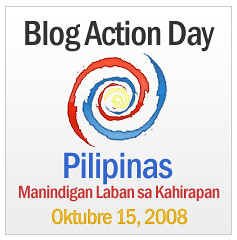In preparing an entry for Blog Action Day, I found this book published by the Asian Development Bank titled Poverty in the Philippines: Income, Assets, and Access. Read it and be enlightened. I made a mind map as a brief interpretation on what was discussed in that publication.
The concerns mentioned is more or less cited in the Philippines 2010 election issues discussion that we started this year.
What stand out and in reference to what is happening these days, in my observation, are as follows:
- Political patronage
Politicians indebted to their party mates and supporters can result to policies favoring the interest of the few (such as the scandal that Senator Manny Villar is currently embroiled in on his real estate company benefiting from government infrastructure projects).
This is the same case on pork barrel where the politician has the main control as to which this limited resource goes to and it often boils down still, if not all, to political patronage.
The same issue on the delayed land reform. The lack of access to land is a big contributor on income inequalities between the rich and the poor and urban to rural. - Accountable government
The likes of Atty. Harry Roque who kept exposing government unusual debt aggregation (such as the latest railway project) is more than helpful. The corruption that emanates from the government and no one gets to be accountable for it leaves a bad taste to Filipino entrepreneurs, professionals, and employees who pay their taxes monthly. This on top of almost everything that we purchase is VAT-inclusive. - A non-tax paying but politically influential church
Although not stated in the ADB report, the lack of population control programs in the country further contributes to the poverty state we are in and is one way or another influenced by the church. Worst, despite the fact that churches in the Philippines collects more contribution and rank one of the highest in the world, it doesn't pay taxes.
Yet, it has unfair influence on population control programs but hardly spends to help the poor. Yes, they may have money to spend on outreach programs but they mostly come from church-goers (and as we've seen in the news - even from politicians and are therefore taxpayers money). I just wish that the next leaders of our country, heads and legislators, will have enough strength to put the church in its proper place on this issue.
Running a country requires resources. A bigger population needs more money. If the church insists on pushing its stand on the population issue then it must begin paying taxes that can be used to help the poor with its need on health, food, shelter, education, among others. - Deterioration of the environment
It is likely that we need to face an almost near deadline problem before government can start implementing environment related laws and policies. Much of the health problems, including those resulting to disability, of our countrymen are facing today is due to pollution. However, instead of penalizing and require more payment for pollutant causing vehicles, their fuel is even subsidized and implementation of the Clean Air Act delayed.
- Encourage social participation
There is so much that can be said about our country's situation. Continuing to pay our taxes, be informed, condemn wrongful actions done by government, and support efforts that intends to stop the culture of corruption must not wane. We have to continue believing that positive change is bound to happen for as long as Filipinos like you and me will remain vigilant and be willing to speak our minds.



